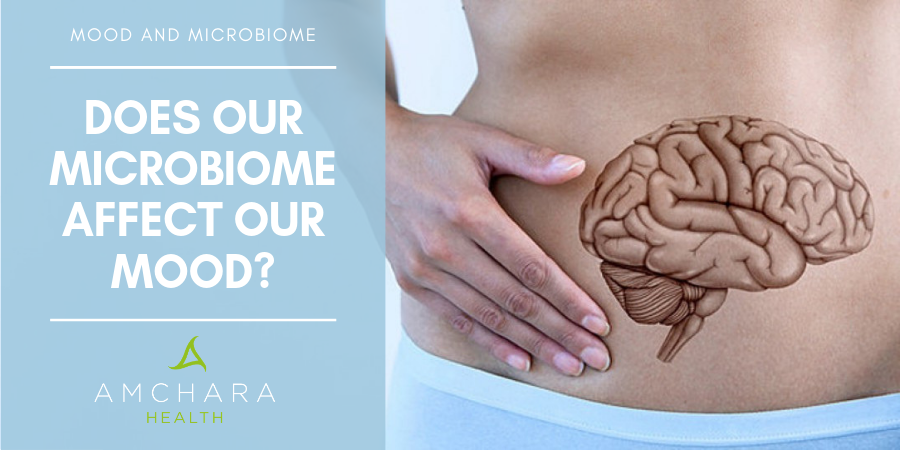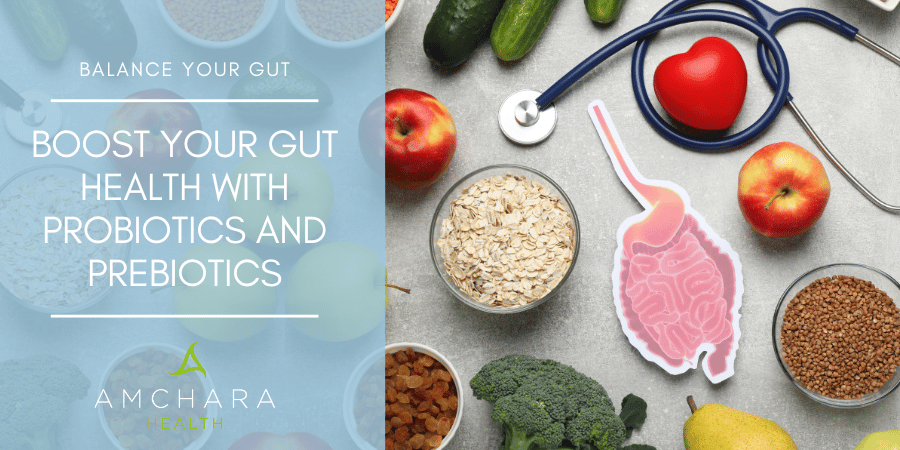The importance of the microbiome
We all play host to trillions of bacteria in our gastrointestinal tract which play an important role in digestion, immunity and the production of nutrients.
Thousands of different species make up this population, with the number and combination of bacterial species unique to each one of us.
Far from their effects being limited to the digestive system, these bacteria are crucial to many aspects of our health and even our psychological wellbeing.
We inherit the beginnings of our microbiome from our mother when we are born, but during adulthood our unique population of bacteria is determined by factors like food choices, stress levels and medical drugs.
Ongoing stress, sugar consumption and drug use such as antibiotics deplete the beneficial bacteria in the gut leaving an opportunity for less favourable ones to gain a foothold.
Recently, research has shown us the microbiome has a significant relationship with our mood.
We always take an evidence-based approach, with actionable knowledge and tips to help you on your journey to optimal health; in this article we’ll look at how your microbiome may be affecting your mood.
The gut, brain and the microbiome
The concept of a relationship between the gut and the brain is entrenched in language.
We have butterflies in the stomach when we are nervous, and we all know sometimes it’s hard to concentrate if we are hungry.
The digestive tract has a complex network of millions of nerves known as the enteric nervous system, which is often called the second brain.
In fact it’s the second largest collection of nerve cells outside the brain.
These nerves are able to act independently of the brain and spinal cord.
The gut and the brain are connected via the vagus nerve, which runs from the head via the neck and chest to the abdomen.
This nerve allows the gut to talk to and influence the brain and vice versa.
This complex communication system also involves hormones and the immune system.
Emerging evidence suggests the microbiome plays a crucial role in these communications.
The physiology of mood
Let’s start by understanding what happens when we suffer from low mood.
A mood is a general feeling, and it often isn’t simply a reaction to a specific occurrence.
Low mood is associated with negative emotions such as anger or fear.
Persistent low mood may be a sign of depression, a serious medical condition which negatively affects feelings, thoughts and actions.
Depression is not merely about sadness, it’s also typically accompanied by symptoms including a loss of interest in enjoyable activities, changes in appetite, sleep disturbances, fatigue and difficulty concentrating.
The brain relies on various chemicals called neurotransmitters which enable brain cells to communicate with one another:
- Serotonin is sometimes called the happy chemical and is associated with elevated mood
- Dopamine is connected with pleasure and reward
- GABA plays a role in the reduction of anxiety
Imbalances in these neurotransmitters in certain areas of the brain can result in mood alterations or lack of motivation.
Now research has linked these imbalances with our microbiome.
Mood and the microbiome
The idea that emotional functioning is connected with our gut bacteria is not a new one.
As far back as 1910, a doctor discovered giving a drink including bacteria improved symptoms of depression.
Many patients with anxiety and depression also have some sort of digestive disturbance such as Irritable Bowel Syndrome (IBS).
Recent research has revealed our microbiome has a profound influence on our mental health.
When bacteria from depressed patients were transplanted to rats, the animals began to exhibit behaviour consistent with depression.
They became disinterested in sugar water they previously couldn’t get enough of (1).
A reduced ability to experience pleasure is characteristic of depression.
The animals also showed physiological changes associated with depression.
Scientists have also discovered patients with severe depression had a reduced diversity in the species of bacteria which made up their microbiome (2).
It’s thought the microbiome interacts with the brain via nerve cells and hormone pathways but despite considerable research, the exact mechanisms by which this occurs remain unclear, because cause and effect is difficult to determine.
Some scientists believe the link lies in hormone-like chemicals released by the gut.
The digestive tract is the largest endocrine organ in the body and secretes many different signalling substances which bind to receptors both on immune cells and nerves.
The release of these substances appears to vary according to the species of the bacteria comprising the microbiome.
One recent study used DNA sequencing to analyse the bacteria of two different geographical populations, then correlated this data with the participants’ self-reported quality of life and mood, as well as information from their GPs.
Two types of bacteria usually found in the human microbiome, called Coprococcus and Dialister, were less abundant in the people who were suffering from depression (3).
The results still held true when the researchers took into account other factors such as gender, medical drug use and age, all of which can impact the microbiome.
On the other hand, increased quality of life scores were correlated with the types of bacteria which can transform fibre into a short-chain fatty acid (SCFA) called butyrate.
This substance is associated both with the health of the intestinal lining and the control of inflammation.
We know increased inflammation is related to depression.
Researchers also found the Coprococcus bacteria plays a role in the metabolism of dopamine, although the exact relationship was unclear.
In a separate study, increasing intake of foods high in omega-3 oils, which are associated with brain function and are often low in cases of depression, boosted the number of Coprococcus bacteria (4).
Researchers already know the bacteria in our digestive system can either produce or stimulate the production of other neurotransmitters apart from dopamine, such as GABA (5) and serotonin.
They can also secrete substances which cause them to be broken down either faster, meaning they’re not available to do their job, or more slowly which can mean they remain too high.
The researchers in the above study put together a list of over 50 substances involved in the functioning of the nervous system which are either produced or broken down by our gut bacteria, so the situation is far from simple.
Adding to the complexity is that these substances can in turn influence the growth of certain bacteria.
So in other words, our gut bacteria manufacture substances which can influence our mood and which in turn can alter the bacteria.
The role of serotonin
Serotonin is a neurotransmitter which is primarily involved in the regulation of mood.
Low levels of serotonin are thought to be a factor in depression.
Although it’s usually thought of in terms of acting in the brain, it’s believed over 90% serotonin produced by the body is made in the gut.
Outside of the brain, serotonin regulates intestinal secretions, and controls muscle function and the perception of pain (6).
It’s believed imbalances in serotonin may be behind both gastrointestinal and mood disorders, however disruptions in the microbiome may be behind these fluctuations in serotonin.
Recent research has shown specific gut species of gut bacteria manufacture serotonin as well as affecting how it behaves in the body (7).
To form serotonin, the body needs an amino acid called tryptophan, which is found in some protein foods such as nuts, seeds, tofu, eggs and salmon.
Supplementation with a specific type of bacteria called Bifidobacteria Infantis resulted in increased levels of tryptophan so it seems likely this bacteria is involved in its metabolism (8).
From all this it would appear microbiome diversity is strongly associated with mood.
Not only do alterations in the gut microbial species contribute to depression, but low mood and depressive states may cause alterations in the balance of species within the microbiome and eventually contribute to further disruptions in mood.
Probiotics and mood
Supplementation of specific strains of friendly bacteria with a view to encouraging a healthier population of gut bacteria has been investigated by scientists with relation to its effect on mood.
One study gave healthy women a fermented milk product containing Bifidobacterium and Lactobacillus species of bacteria for four weeks.
When the volunteers’ brains were examined by MRI scans, changes in nerve activity were seen in areas of the brain concerned with the processing of emotions and sensation while performing a set task (9).
Another study gave a mix of the same species of bacteria to people who were not depressed.
The researchers found taking the probiotic resulted in fewer negative and aggressive thoughts associated with sad mood (10).
If our thoughts tend to react negatively to temporary changes in our mood, we are more likely to develop depression.
The role of fibre
The parts of plant matter we can’t digest still perform a useful purpose in our bodies because they provide food for our gut bacteria and encourage the growth of the beneficial strains.
The fibre is fermented by the bacteria and various substances produced which contribute to the health and integrity of the intestinal lining but also find their way into the bloodstream and to the brain.
This type of fibre is known as prebiotic and includes fructo-oligosaccharides (FOS) and inulin.
Takeaway
When we start to think about the many factors which can affect our microbiome, it emphasises our psychological and physical wellbeing are closely linked.
By looking at your body as a whole, and you as an individual, personalised medicine recognises both the close relationship between the gut and the brain, and the contribution of your own health history, genetics, lifestyle and food choices to a major part of the gut/brain axis – the microbiome.
If you would like to explore how your personal microbiome may be influencing your mood, a stool test can look at the balance of bacteria within your gut.
Also of use may be a DNA test to examine how your personal genetic makeup is influencing your metabolism, and an organic acids test which, by measuring the by-products of metabolism in your urine, can see how your microbiome may be influencing the levels of neurotransmitters in your body.
In conjunction with a consultation with a qualified Amchara Personalised Health practitioner, this knowledge can be instrumental in guiding you towards nutritional and lifestyle interventions to help support your health and balance your mood.
We’re dedicated to providing you with both insightful information and evidence-based content, all orientated towards the Personalised Health approach.
Did you find this article useful?
Have you noticed a link between your digestion and mood?
We would love to know your thoughts.
With your comments let’s continue the conversation.
By Cathy Robinson BScDipNutMed
READ THIS NEXT:




